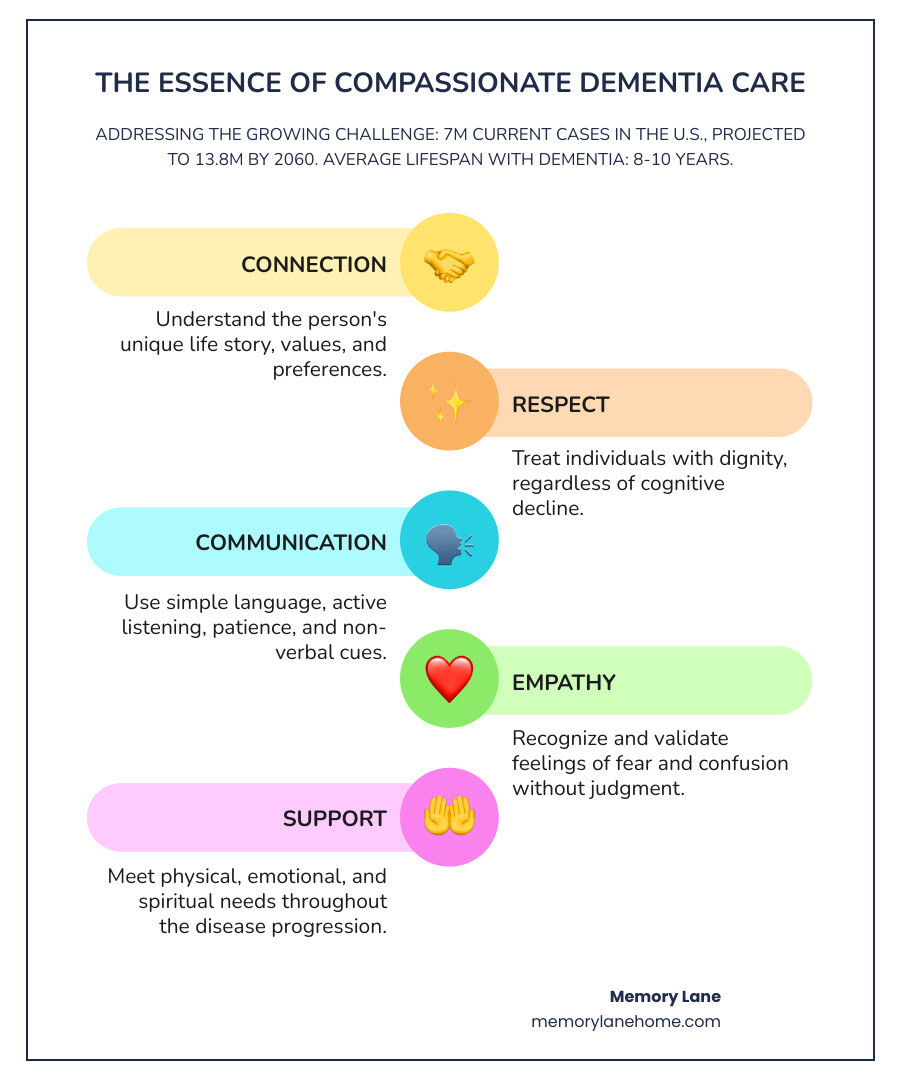Your guide to assisted living Michigan: explore costs, services, financial aid, and top communities for senior care.

Nurturing Well-being: Elevating Quality of Life in Dementia Care
Compassionate Dementia Care: Elevate Well-being 2025
Why Compassionate Dementia Care Matters Now More Than Ever
Compassionate dementia care is a person-centered approach that prioritizes dignity, respect, and emotional connection. It involves understanding a person’s life story, communicating with patience, and meeting their physical and emotional needs with empathy.
Nearly 7 million Americans over 65 live with dementia, a number expected to reach 13.8 million by 2060. These figures represent millions of families navigating the challenges of memory loss, confusion, and behavioral changes. As symptoms progress, the need for intensive, supportive care grows, often leaving families feeling overwhelmed.
Fortunately, person-centered care focused on compassion can dramatically improve quality of life. Research shows this approach reduces patient distress and helps preserve a person’s sense of identity. However, compassionate care is often lacking in health systems. For example, one study found 57% of nursing home residents with advanced dementia had at least one traumatic emergency department visit in their last month of life, highlighting the need for better care models.
I’m Jason Setsuda, a Board Certified Emergency Medicine Physician and CFO of Memory Lane Assisted Living. With over a decade in medicine and experience as a hospice Medical Director, I’ve seen how a holistic approach honoring the mind, body, and spirit is essential to compassionate dementia care and can transform the end-of-life experience.

The Heart of Dementia Care: Understanding Compassion and Empathy
Dementia is a terminal illness, with a typical journey of 8 to 10 years. Despite this, it’s often not treated as such, leading to aggressive and unwanted treatments near the end of life. This is where compassionate dementia care becomes essential.
While sympathy is feeling for someone and empathy is feeling with them, compassion goes further. It’s an awareness of another’s suffering combined with an active effort to relieve it. This approach, rooted in dignity-conserving care, preserves a person’s sense of worth and identity. When care is compassionate, it fosters connection, reduces patient distress, and improves clinical outcomes, creating an environment of safety and joy.

Why Compassion is Crucial for Individuals with Dementia
For many with dementia, the world becomes unpredictable and frightening. As cognitive abilities decline, their emotional sensitivity often increases. They may not remember what you said, but they will remember how you made them feel. In this state of heightened awareness, compassion is a lifeline that helps them feel safe and understood.
Maintaining personhood is at the heart of this care. It means seeing the individual beyond the symptoms and affirming that their life still has meaning. Building trust through compassion is vital for reducing agitation. This is why validating their feelings—rather than correcting their reality—is so important. Acknowledging their concern and gently redirecting, without dismissing their emotions, prevents further confusion and fear. The focus shifts from what’s lost to what remains: their emotions, spirit, and capacity for joy.
The Impact on Caregivers and Families
Caring for someone with dementia is physically and emotionally demanding. Caregiver stress and burnout are serious health concerns, as many neglect their own well-being. This journey can feel isolating and heartbreaking.
However, when caregivers adopt compassionate approaches for both their loved one and themselves, the experience transforms into a shared journey. It can strengthen family relationships as everyone learns to work together and find new ways to connect. The relationship evolves, focusing on maintaining positive connections and finding meaning in present moments. Simple activities like looking at photo albums or sharing ice cream become precious gifts. These moments of connection, grounded in compassion, help families steer difficulties with greater resilience.
The Pillars of Compassionate Communication
As dementia progresses, communication becomes more challenging and more important. Effective communication is about creating a genuine connection that honors the person and validates their experience. Non-verbal cues like body language and tone of voice often speak louder than words. When cognitive abilities decline, people become highly attuned to the emotional temperature of a room. Active listening and patience are not just virtues; they are necessities in compassionate dementia care.

Key Components of Compassionate Dementia Care Communication
Certain communication approaches consistently reduce confusion and build trust.
- Use simple language. Short, clear sentences work best. Instead of complex questions, try a simple statement: “It’s time for your medicine.”
- Ask one question at a time. Bombarding someone with choices is overwhelming. Ask one thing, wait for a response, then move on.
- Avoid arguments. Arguing about facts with someone whose reality has shifted only causes distress. Acknowledge the feeling behind their statement, not the factual error.
- Use names. Addressing the person by their preferred name, and gently reintroducing yourself, can help anchor them.
- Use positive reinforcement. Celebrate small victories to build confidence and reduce anxiety. “You did a great job putting on your sweater!”
- Practice validation therapy. This involves acknowledging the person’s reality. If they say they need to go to work, you might respond, “Tell me about your work.” This validates their identity without arguing.
A study on cognitive stimulation shows that meaningful conversation is therapeutic, reminding us that every interaction is an opportunity for connection.
How to Ask Questions That Nurture Connection
The goal of asking questions is to create opportunities for connection and reminiscence, not to test memory. Effective questions are often open-ended, focus on preferences or sensory experiences, and offer simple choices.
Reminiscence prompts about childhood or early career can tap into long-term memories that often remain intact. Sensory questions about smells or tastes can also be powerful. When offering choices, make them simple: “Would you like tea or coffee?” works better than “What would you like to drink?”
Here are some effective questions:
- “What do you enjoy doing most during the day?”
- “What are your favorite smells or types of music?”
- “Tell me about your favorite season.”
- “If you could visit anywhere, where would you go?”
Create a quiet, comfortable space for these conversations. Sit at eye level, reduce distractions, and give them plenty of time to respond. Your presence and patience communicate care, even when words fail.
Overcoming Challenges in Providing Compassionate Dementia Care
Providing compassionate dementia care is challenging. Caregivers often face a lack of training, systemic pressures, time constraints, and emotional fatigue. It can be difficult to respond to confusing behaviors or to fight therapeutic nihilism—the feeling that because dementia is incurable, nothing matters. While we can’t cure dementia, we can absolutely improve how someone experiences living with it.

Understanding and Responding to Challenging Behaviors
Challenging behaviors are communication. Agitation, wandering, or repetitive questions are often expressions of an unmet need or distress that the person cannot otherwise articulate. The person isn’t giving you a hard time—they’re having a hard time.
Your job is to be a detective. Look for triggers: Is the person in pain, hungry, thirsty, bored, or frustrated? Is the environment too noisy or confusing? A simple change, like turning down the TV, can make a huge difference.
When agitation arises, use the 4Rs approach: Reassure them that they’re safe. Reconsider the situation from their perspective. Redirect their attention to something pleasant. Relax—your calm demeanor is crucial, as stress is contagious.
For example, if someone is asking for their mother, they may be expressing a need for comfort. Instead of correcting them, validate the feeling: “You must really miss her. Tell me about her.” This acknowledges their emotion and provides comfort.
The Negative Impact of Lacking Compassion
When compassionate dementia care is absent, the suffering is measurable. Patients receive care that prioritizes protocols over people, leading to increased fear and distress. Statistics show the grim reality: about 30% of PEG tubes (surgically placed feeding tubes) are inserted in people with dementia, despite a lack of evidence for their benefit. Furthermore, 57% of nursing home residents with advanced dementia have at least one traumatic emergency room visit in their last month of life.
For families, witnessing this kind of care is devastating, exacerbating feelings of guilt and grief. For care staff, working in environments that don’t prioritize compassion leads to burnout and high turnover. This “malignant social psychology” undermines the personhood of residents and creates a cycle of poor care. Compassion isn’t a luxury; it’s the foundation of effective dementia care.
Professional Strategies and Educational Pathways
To improve the lives of people with dementia, we need professional strategies and training that support compassionate dementia care. Person-centered care models are the foundation, recognizing that each person has a unique life story and personality that should be honored.
Frameworks like The 6Cs (Compassion, Competence, Communication, Courage, Commitment, and Care) and the SPECAL method guide professionals to create safe, positive interactions. Function-focused care encourages independence by adapting tasks to current abilities. These frameworks help create customized care plans that evolve with the person’s needs. At Memory Lane, these principles guide our daily practice.
Implementing Compassionate Dementia Care in a Professional Setting
Putting compassion into practice requires commitment. We follow dementia care practice recommendations from groups like the Alzheimer’s Association to ensure quality care.
- Staff training is critical. We teach communication techniques, how to manage challenging behaviors with approaches like the 4Rs, and how to recognize unmet needs.
- Dementia-friendly environments reduce confusion and promote independence through clear signage, familiar objects, and reduced sensory overload.
- Team collaboration ensures a coordinated approach, while open communication with families creates a true partnership in care. Family insights are invaluable for honoring the whole person.
Designing Educational Programs for Future Healthcare Professionals
Healthcare professionals’ attitudes toward dementia are often formed during their training. Unfortunately, research on improving student compassion shows that compassion is often lacking in health systems, which negatively impacts patient care.
Effective educational programs should include:
- Early exposure to dementia: Programs that involve students visiting families affected by dementia can dramatically improve empathy.
- Practical communication skills: Training in validation therapy and other person-centered techniques provides essential tools.
- Emotional support: Helping students manage the emotional demands of the work prevents burnout and enables them to be more compassionate.
- A focus on connection over tasks: Teaching students to learn a person’s life story builds genuine relationships.
- Understanding dementia as an illness: Shifting perspective from seeing challenging behaviors as intentional to seeing them as symptoms of a disease is transformative.
By integrating these elements into healthcare education, we can cultivate a future generation of professionals who bring both competence and deep compassion to dementia care.
Finding Support: A Resource Guide for Dementia Caregivers
Caring for someone with dementia is a long journey that requires resilience and support. Asking for help is not a sign of weakness; it’s a sign of strength. Caregiver burnout is a serious risk, so taking care of yourself through respite, community connection, and planning is a necessity, not a luxury. You can’t pour from an empty cup.
National Organizations and Federal Resources
A wealth of support exists at the national level to help families steer the dementia journey.
- Alzheimer’s Association: Offers a 24/7 Helpline, support groups, and educational programs.
- Alzheimer’s Foundation of America: Provides educational resources and connects families with care professionals.
- National Institute on Aging: Offers research-based information on dementia types, treatment, and caregiving.
- Eldercare Locator: A public service to connect you with local services for older adults.
- BenefitsCheckUp: A free service to identify federal and state benefit programs you may qualify for.
- Specialized Organizations: For specific dementias, consult the Lewy Body Dementia Association, the Lewy Body Dementia Resource Center, and The Association for Frontotemporal Degeneration.
- Other Resources: The National Task Group on Intellectual Disabilities and Dementia Practices, Indian Health Service, and the ADEAR Center offer specialized guidance and information.
- Government Benefits: Visit Benefits.gov and the Social Security Administration for information on financial assistance.
Local and Community Support
Sometimes the most helpful support is local. These organizations can provide hands-on help.
- Area Agency on Aging (AAA): Your local AAA is the best place to start for information, referral, and caregiver support programs. Find yours at https://www.n4a.org/.
- Local support groups: Connecting with others who understand your journey can be life-changing. The Alzheimer’s Association hosts groups nationwide, which you can find via your local chapter.
- Faith-based organizations: Many religious communities offer support networks, respite care, and counseling.
- Geriatric care managers: These professionals can help you steer the complex world of elder care, coordinate services, and guide decisions.
- Mental health professionals: Therapists specializing in caregiver stress can provide crucial emotional support and coping strategies. Taking care of your mental health is essential for providing long-term compassionate dementia care.
Frequently Asked Questions about Compassionate Dementia Care
Over my years working with families, many of the same questions come up. Here are answers to some of the most common ones.
How do you show compassion to someone with dementia?
Showing compassion starts with patience, active listening, and validating feelings instead of correcting facts. Use a gentle tone, make eye contact, and focus on what they can still do, like listening to music or folding laundry. This approach connects with the person behind the disease and helps them feel valued and understood.
What is the most challenging aspect of dementia care?
For many caregivers, managing behavioral symptoms like agitation or paranoia is the hardest part. These behaviors are not intentional; they stem from confusion, fear, or an unmet need. The challenge is responding with patience when you are tired and stressed. Understanding that these are symptoms of the disease, not a reflection of your loved one, is key.
Can a person with dementia feel love and compassion?
Absolutely. While cognitive functions decline, emotional intelligence often remains remarkably intact. People with dementia can feel love, comfort, and joy throughout their journey. A gentle touch, a warm smile, or a familiar song can bring visible happiness. Your loved one may not remember your name, but they can feel the love in your presence. This is why the emotional quality of our interactions in compassionate dementia care matters so much.
Conclusion: A Future of Dignity and Well-being
Compassionate dementia care is a practical approach that improves daily life for individuals with dementia and their families. By leading with compassion, we honor dignity, respect the person’s journey, and create genuine emotional connections.
While the challenges are real, giving caregivers the right tools—effective communication, training, and support—allows them to improve their loved one’s quality of life. This shift from task-based routines to person-centered connection transforms caregiving from a burden into a shared journey, creating space for moments of joy and love.
At Memory Lane, this philosophy is at the core of what we do. We provide 24/7 personalized, compassionate support in a secure environment where residents feel safe, valued, and understood. Our team is trained to see the person first, always, because everyone deserves to live with dignity and respect.
Learn more about our compassionate approach in our assisted living homes in Detroit, Michigan



